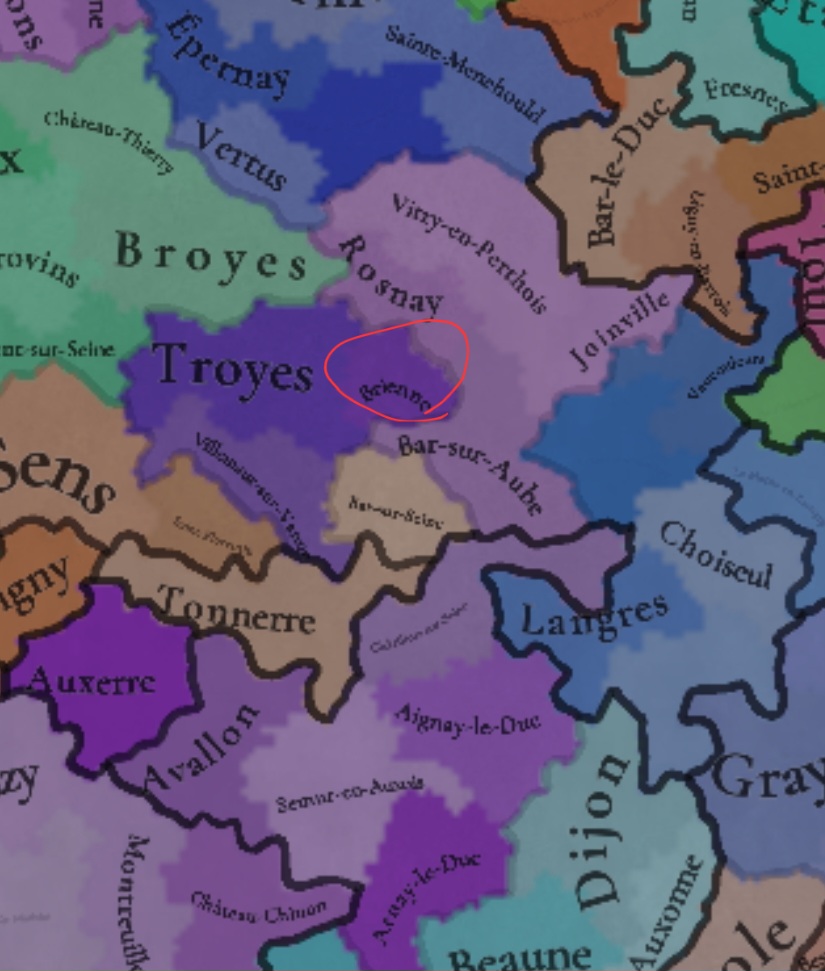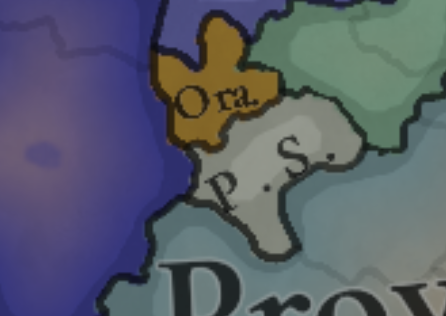Alpine is based on
Vivaro-Alpine, a name coined in the lifetime of some of the people here for an Occitan dialect that had long been considered a variety of Provençal. It's an extremely awkward designation given that there is nothing about this culture making it more Alpine than any other culture in that mountain range, not to mention the fact that it extends well into the plain, as you can see from the terrain map. I'm pretty sure it's only there because Pavía didn't like
Vivaro-Alpine. It should simply be merged into Provençal. Perhaps the same can be done to Languedocien; I don't know about 1337, but that would have been the correct move in 1037 and possibly in 1237.
If there really was such a thing as an Arpitan culture, why did none of the people taking part in it ever call it by that name, or by any other? The language was only recognized as one in the 1870s, as
Franco-Provençal, while the term
Arpitan was coined a century later. The reason it took so long is that the territory it's spoken in is fragmented and the dialects are very different from each other. A common identity would have had a hard time establishing itself here without political factors at play (namely the evolution of Swiss statehood in the case of Romand). Since I don't advocate splitting it up into several mini-cultures, I'd rather see it absorbed by a neighbor. (More on that later.)
As for
Franc Comtois, it's anachronistic, since
Franche-Comté first appears (as
France-Comté) in 1366 and would take a long time to impose itself. And the initial form would have been something more like
Francontois.
Transferred to Wandsworth 06/2009
archive.org

www.cnrtl.fr
Furthermore,
Comtois means "of the County," and this was a time and place when a count was a someone with an actual function. So would anyone in 1337 have described themselves as such, even if the place had already been called
Franche-Comté? Imagine, in the year 2024, describing someone from Northern Ireland as a
Provincial. Or someone from Austin, Texas as a
Gubernatorial. Or someone from Switzerland as a
Confederate. Or someone from Hamburg as a
Hanseatic. More than a few Latin Americans have insisted that people from the USA should be called
United Statesians in English; how many English-speakers have they convinced? I myself, a Romanian, sometimes call people from Bucharest
Capitalists, but that's a malapropism I stole from I. L. Caragiale, not a real demonym. (The only exception I can think of is
Emirati.) This sort of thing is not impossible as a long term development, which is why we have
Provençal (after there stopped being any Roman province anywhere beyond the Alps) and
Franc-Comtois itself (
after the Free County of Burgundy was gobbled up by larger powers). But I don't envision it happening while that county is a real state.
And even putting that aside, it would make no sense at this time to reserve
Franc Comtois for just the non-Arpitan population of the Free County. Were the people in the south not also "of the Free County?"
The Arpitan, Bourguignon and Franc Comtois cultures need to be merged into a single Burgundian culture.
The language boundary between the
langues d'oïl and the
langues d'oc was in the process of moving south. It had once been as far north as the Loire Valley and would eventually, after the depopulation of the 100 Years' War, reach the Gironde estuary. All or part of the Saintongeais-speaking area would have spoken a
langue d'oc at this point instead. Based on this and the strong similarities between Saintongeais and Poitevin, I suggest removing the Saintongeais culture altogether.
I think Walloon should be joined to Picard. The word in the
langues d'oïl only goes back to the 15th century - though obviously its Germanic equivalent is much older - and its precise geographical coverage was initially vague, sometimes stretching into a crescent shape from the Channel coast to Lake Geneva, sometimes excluding a place as quintessentially Walloon as Liège.

fr.wikipedia.org
Actually, an argument can be made for uniting all the cultures based on the
langues d'oïl other than Bourguignon into a single culture called
French or
François. (The latter is not a typo, it's a historical Easter egg.) The only real objection I'd have is what to do, then, about the comparatively numerous
langue d'oc cultures. (A single Occitan culture?) Anyway, as a bare minimum, Francien (named after a 19th century neologism) should be renamed to
French/
François and absorb Berrichon.
As an awkward alternative to this, limit French to the territory surrounding Paris and join all the cultures of the Loire Valley (Berrichon, Angevin, Gallo, Poitevin, southern Francien) into a single culture named... well, I don't know. Probably not that good of an idea, but I'm putting it out there in case someone can do more with it than I can.












